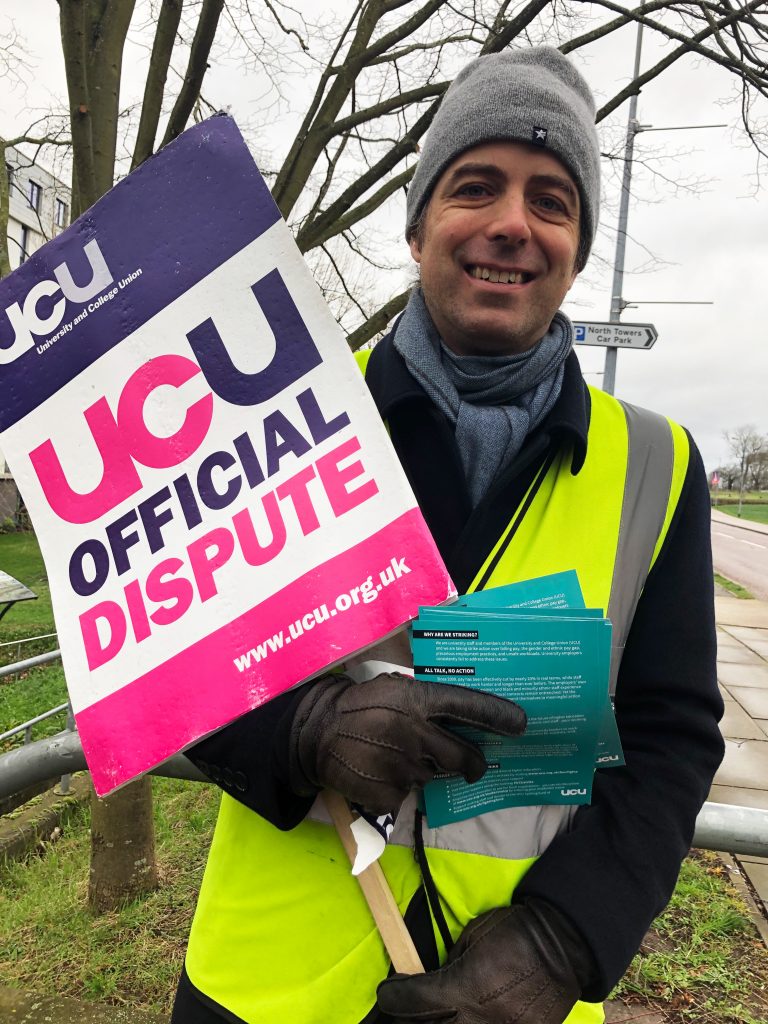This is the last week of the latest round of UCU strikes and Stanley Masters went to the scene to ask our lecturers why they are striking.
Essex Academics have formed picket lines around the campus as they protest over pay, pensions and working conditions.
Beginning on the 20th February and continuing until the 13th of March, members of the University and College Union (UCU) have been taking part in what is their fourth strike in the last three years, and the second this academic year.
Staff at 74 different universities have been taking part in the action, with the UCU demanding that universities address extreme workloads, the gender pay gap, pensions and casualisation.
Cathy Crawford, a history lecturer and the president of the UCU Essex branch, was out picketing on the first day of the strikes, and reiterated these demands; “We’re striking today and probably for the next 14 days because the terms and conditions of university staff have deteriorated so much over the last 10 years that it has become completely intolerable. We need to have progress, not just on pay but on casualisation and the overload of workloads.
“49% of people who are teaching in British universities are on fixed-term insecure contracts. The universities are running on unpaid labour of professional services staff as well as academics. Someone who’s a research manager told me she worked 100 unpaid days last year when she added up all the hours had worked on evenings and weekends.”
“We need to have progress, not just on pay but on casualisation and the overload of workloads.”
When asked what impact she hoped the strike would make, she replied “We want this individual strike to support our negotiations. We’re nearly there and what we hope to get is an agreement that we stop striking and everybody goes back to their individual universities and negotiates ways to make real progress within a fixed time period on inequality, casualisation, workload and pay”
“We’re nearly there, that’s why we’re so buoyant and that’s why the students are supporting us. We’ve been working on this for a while and we’re astonished that we have to come out again, because we have so much support. Our own Vice Chancellor is supporting us. He’s gone public with his support, especially on the pensions. He says you can’t run a university without quality pensions,” she added she hoped this would be the final strike.

Fabian Freyenhagen, a professor in philosophy, was also on the picket line; “I’m here striking today because working conditions of academics affect working conditions of students, and also for equal pay. Quite a lot of female academics and minority group academics are paid less for the same work as white male academics.
“We hope the outcome of the strike is that we can get equal pay for equal jobs. There should be less casualisation; workloads have to be decreased. And that affects students directly, for example student staff ratios are around fifteen or sixteen to one and we want to bring them down to ten to one which would be much better for students.
“We would also like that the individualisation of the pension scheme is reserved. It’s a really neoliberal way of shifting risk from institutions which have much deeper pockets to individuals.”
Pam Cox, a professor of sociology, gave her reasoning behind striking as “to protect the quality of education and access to education. The particular issue around pensions is around protecting our agreed benefits, which we’re very concerned are going to be eroded. But also, it is protecting the pension rights of the next generation of academics, because they are likely to face much worse conditions than the ones I’m likely to enjoy. So, it’s really about a next generation struggle for me.”

With university fees so high, such strike action could have been controversial with students. However, many have shown support for those taking action. One second-year international relations student sympathised with the strikers as she felt lecturers had the right to protest if they felt they were being overworked. A first-year psychology student also expressed her support, but was worried about scheduled exams in the strike period potentially not going ahead.
UCU leaders have threatened further strikes during the exam period if this wave of strikes does not bring about change, but students have been informed of the fact that any information they miss out on while their lecturers are on strike will not come up in those exams in the summer.
What can students do to support the strikes? Callum Marshall believes that boycotting the NSS is the best way students can have an impact, find out more in his latest article.